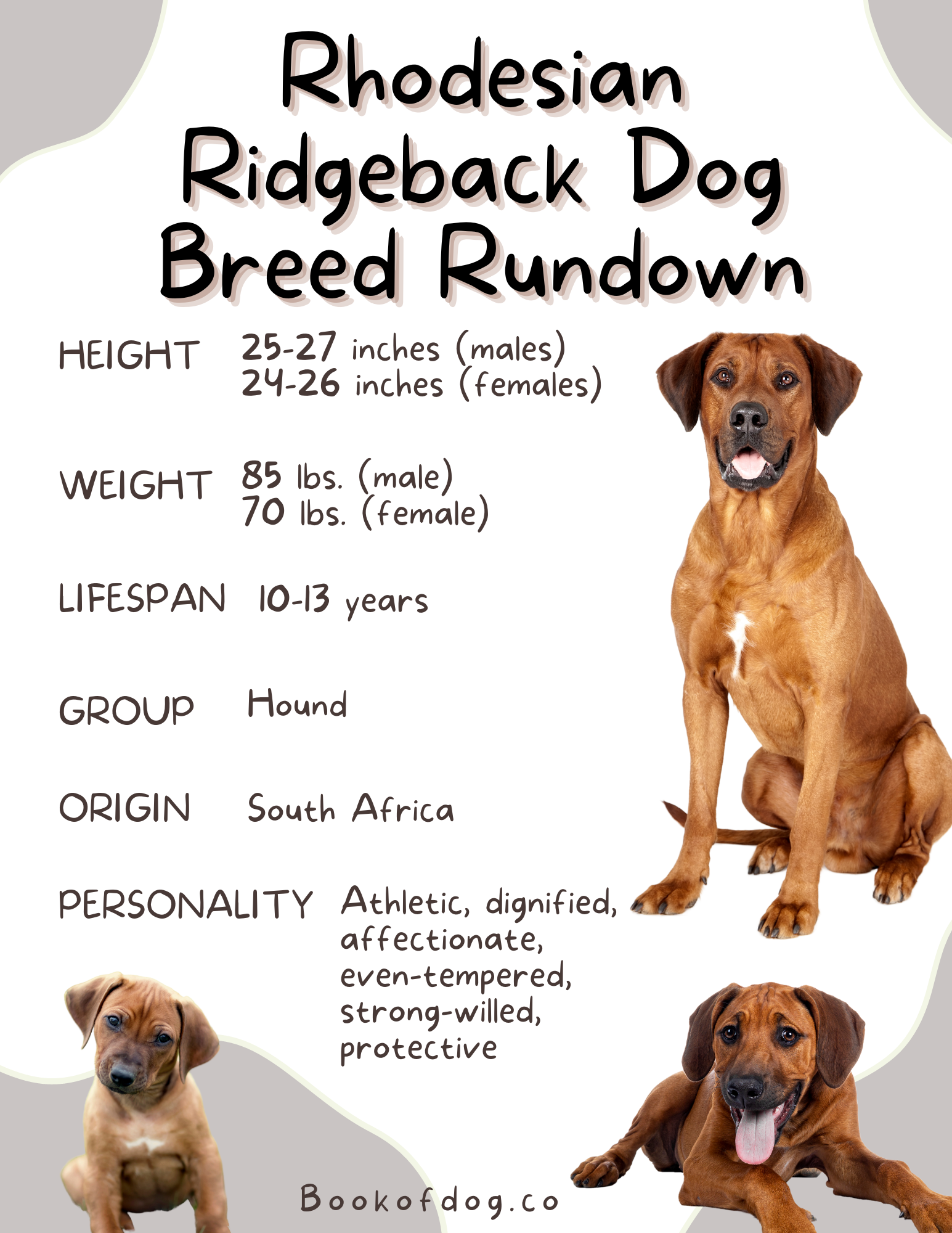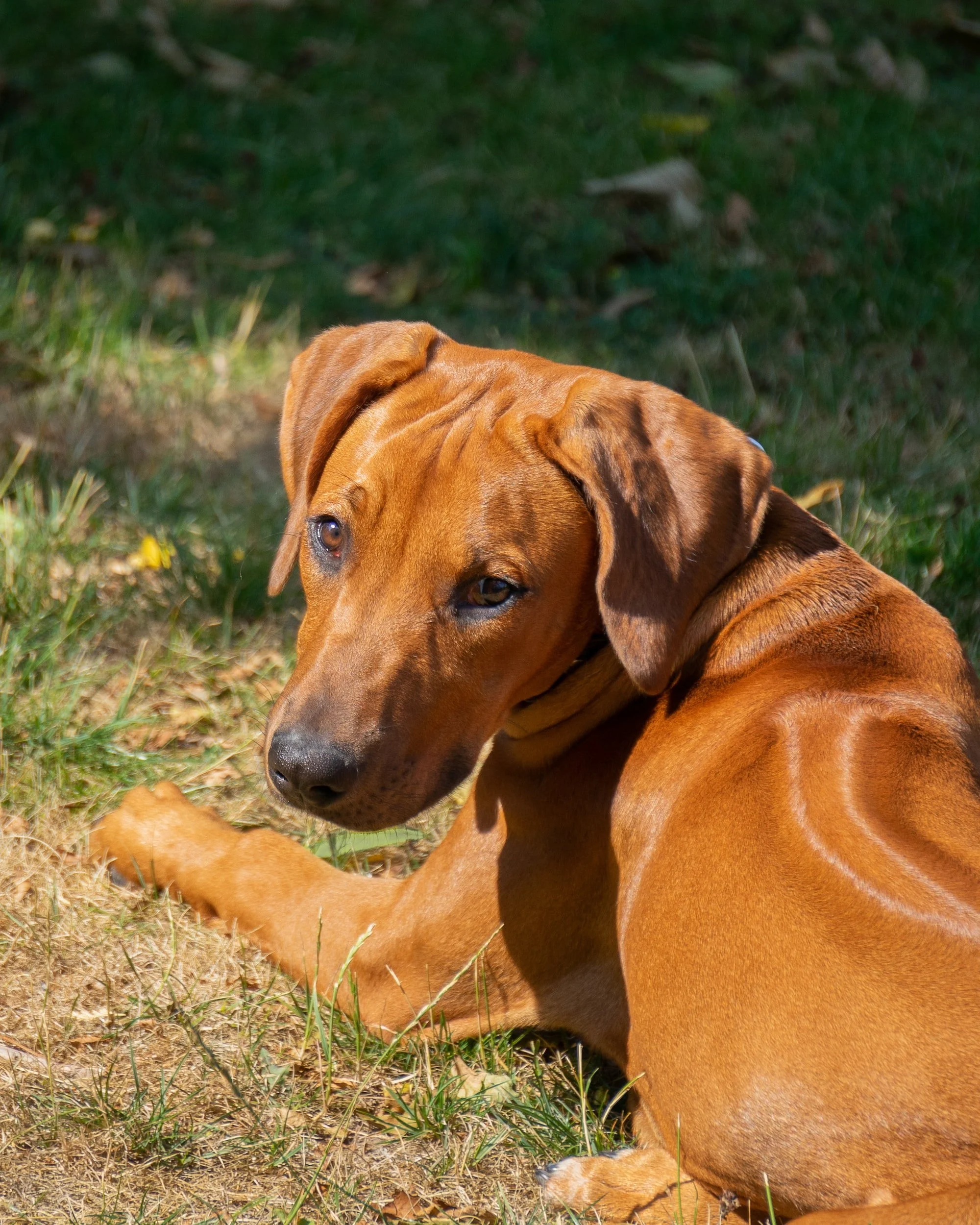Rhodesian Ridgeback Dog Breed Information
Photo by Getty Images.
The Rhodesian Ridgeback dog hails from South Africa, where they were used for hunting lions and protecting their humans. These all-purpose hounds are powerful tracking dogs that are courageous, even-tempered, and protective of their families. Ridgebacks are large, strong dogs with lots of endurance and make great running companions.
The Rhodesian Ridgeback dog is known for its trademark strip of hair growing in the opposite direction along the backbone, giving the dog its name. Ridgebacks are reserved with strangers and affectionate with family and friends, making them excellent guard dogs.
Rhodesian Ridgeback Dog Breed Rundown
Height: 25 to 27 inches (males), 24 to 26 inches (females)
Weight: 85 lbs. (males), 70 lbs. (females)
Lifespan: 10 to 13 years
Origin: South Africa
Personality: Rhodesian Ridgebacks are powerful, athletic hound dogs with a strong prey drive. These pups are very affectionate and protective of their family members and are reserved with strangers. Ridgebacks have strong-willed, courageous personalities and require plenty of exercise and firm but fair training.
Rhodesian Ridgeback Appearance
Photo by Ilona Frey for Unsplash.
Rhodesian Ridgebacks have a stately, athletic appearance. These tall hound dogs are lean and muscular, with short, dense fur that comes in different hues of the same color - wheaten. The Rhodesian Ridgeback dog can range from a light tan color to a deep red and mahogany hue. Ridgebacks have short coats that help them stay cool in the South African heat. These tough dogs can withstand temperature extremes and are especially well-equipped for hot weather.
The Ridgeback gets its name from the line of fur that grows in the opposite direction along the spine. The ridge goes from behind the shoulders down to the hips and is usually about 2 inches (51 millimeters) in width at the widest part. The unique ridge is believed to have come from the wild African dog population which had a similar ridge.
Ridgebacks often have darker coloring on their faces, and most have black noses, with some having brown noses. Small patches of white fur are allowed on the chest and toes, according to the American Kennel Club.
Ridgebacks are sturdy dogs that are slightly longer than they are tall. They have a powerful appearance and are excellent runners and athletes.
Rhodesian Ridgeback History
Photo by Justus Menke on Unsplash.
The modern Rhodesian Ridgeback dog is descended from semi-domesticated ridged hunting dogs and guardian dogs in Southern Africa mixed with European dogs. Ridgebacks were bred for hunting lions in packs by tracking and chasing lions to keep them at bay for hunters.
Ridgebacks are versatile large dogs that are sighthounds, scenthounds, and mastiffs. The Ridgeback was developed by Europeans mixing dogs with semi-wild hunting dogs that guarded and hunted with the Khoikhoi people in southwestern Africa. These courageous hunting dogs were known to be fearless. Europeans added a variety of dogs to the native hunting dogs, including Greyhounds, Mastiffs, Bloodhounds, Pointers, and even Terriers. Great Danes have genetic similarities with Rhodesian Ridgebacks, suggesting that they were also used in the breeding of Ridgebacks.
Ridgebacks were bred for hunting large game such as lions and boar and they were also used as guardians and protectors. These athletic dogs are dignified and imposing and today retain a strong prey drive and protective instincts.
The breed standard was drafted in 1922, when the first Rhodesian Ridgeback Club was founded in then Rhodesia (now Zimbabwe). The Rhodesian Ridgeback Club of Great Britain was founded in 1952. The American Kennel Club recognized the Rhodesian Ridgeback dog breed in 1955.
Rhodesian Ridgeback Personality
Photo by Getty Images.
Rhodesian Ridgebacks are loyal, intelligent, and active dogs who love being with their families. The Rhodesian Ridgeback dog is reserved with strangers but not aggressive. These reserved pups save their love for their family and friends. Although they need plenty of exercise - at least two hours a day, Ridgebacks are quite calm inside and enjoy cuddling and lounging with family.
Ridgebacks are sight hounds and have a high prey drive so they will often chase after smaller animals. They can also be strong-willed, so owners must be firm and fair with training. Most Ridgeback owners say their dogs are very food motivated and will counter surf and search for treats, so it’s important to keep food off counters.
Owning a Ridgeback is best for people who love outdoor activities, as these natural athletes love to run, hike, and explore the outdoors. Some great sports to enjoy with your Ridgeback include running, hiking, and lure coursing.
Training Rhodesian Ridgebacks
Photo by Ilona Frey for Unsplash.
Ridgebacks were bred to think independently on the hunt and they are strong-willed and intelligent. These smart pups can be stubborn so consistency and patience are important when training them. Due to their large size, socialization is especially important for Ridgebacks so giving them positive experiences around a variety of people and other animals is vital.
Ridgebacks do not respond well to harsh training and require patience and fairness. These hound dogs are highly food-motivated so training with treat rewards can work very effectively.
Rhodesian Ridgebacks are fast dogs that love to run and they excel in outdoor sports and activities. Some people enjoy running with their Ridgebacks and some train them in lure coursing. In lure coursing, dogs chase mechanical lures around a course, and this is especially rewarding for sighthounds like Ridgebacks, who were bred to chase lions.
Famous Rhodesian Ridgebacks
Photo by Andrea Lightfoot on Unsplash.
The Rhodesian Ridgeback is not a common breed so they may have less famous pups than some breeds, but their fans are extremely dedicated and include royalty and Hollywood icons.
Celebrities with Ridgebacks
Princess Charlene of Monaco has a Rhodesian Ridgeback named Khan.
Hollywood actor Errol Flynn was a Ridgeback lover who helped make the breed more popular in the U.S. in the 1930s.
NBA star Blake Griffin has a Rhodesian Ridgeback named Chaney.
Actor Patrick Swayze had a Rhodesian Ridgeback named Kumasai.
Hollywood star Grace Kelly and Prince Rainier had a Rhodesian Ridgeback that they adored.
Rhodesian Ridgeback Health
Photo by Peter Schulz for Unsplash.
Rhodesian Ridgebacks are generally healthy but can have some health problems, with the following being some of the more common issues among the breed:
Hip dysplasia is a common problem in larger breeds and can cause pain and arthritis in the hips.
Dermoid sinus, a genetic condition that stems from a neural tube defect and usually requires intense medical treatment.
Hypothyroidism is a growing condition among Ridgebacks and can cause weight gain and hair loss. Luckily, once this condition is diagnosed, it can be treated with affordable medication.
Gastric dilatation volvulus, otherwise known as bloat, is a sudden digestive problem that affects large breeds and is a potentially fatal condition that requires immediate treatment.
Where to Get a Rhodesian Ridgeback
Photo by Anuja Rupasinghe.
If you’d like to adopt a Rhodesian Ridgeback dog, you can find purebred rescue pups at different rescues around the country. Here are some resources to help:
The Rhodesian Ridgeback Club of the United States was founded in 1957 and is the official AKC Parent Club for the Rhodesian Ridgeback. The club offers resources and a directory of breeders and rescue groups dedicated to the Rhodesian Ridgeback.
Rhodesian Ridgeback Rescue has adoptable Ridgebacks throughout the U.S. and Canada.
Ridgeback Rescue of the U.S. is a national RIdgeback rescue with adoptable Ridgebacks around the country.
Ridgebacks & Friends is a Ridgeback rescue in California with adoptable pups.
Rhodesian Ridgeback Rescue in Northern California is a Ridgeback rescue serving the Northern California region.
Texas Independent Rhodesian Ridgeback Rescue is a Texas-based rescue that has adoptable Ridgebacks.
Petfinder is a great resource that connects many different shelters and rescues around the country. You can find rescue Ridgebacks near you using the search tool.
If you’re ready to adopt a Rhodesian Ridgeback and start an active life together, check out our 10 Tips to Prepare Before Adopting a Dog to make sure you have everything you need ready to welcome your new furry family member.








